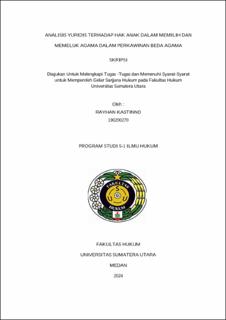Analisis Yuridis terhadap Hak Anak dalam Memilih dan Memeluk Agama dalam Perkawinan Beda Agama
Juridical Analysis of Children's Rights to Choose and Embrace Religion in Interfaith Marriage

Date
2024Author
Kastinno, Rayhan
Advisor(s)
Sembiring, Idha Aprilyana
Afnila
Metadata
Show full item recordAbstract
The diversity of communities living side by side certainly has an impact on people's daily lives. One of them is a marriage carried out by two prospective bride and groom with different religions or what is usually called an interfaith marriage. The contradictions, debates and disputes that arise in interpreting the validity of an interfaith marriage make it a marriage full of controversy. One of the problems that arises due to the unclear status of the legality of interfaith marriages is related to the child's right to choose their own religion. As is known, religion is something that is passed down from parents to children. For this reason, when children are adults or are considered to be responsible for their choices, children should not be forced to follow religious teachings. Because the right to freedom of religion is a part of private human rights that cannot be separated from every individual. So the problem arises, what is the validity of an interfaith marriage? What are the rights of children in interfaith marriages in terms of determining their own religion? And how is the legal protection for children's right to freedom of choice of religion in interfaith marriages? The research used is normative legal research with the approach used being legislation. Normative legal research is a process of finding legal rules, legal principles and legal doctrines to answer a legal issue. This research is supported by data obtained from literature data including statutory regulations, books, and Constitutional Court Decisions, and in this case the data was processed using qualitative analysis.
With the issuance of Supreme Court Circular Letter Number 2 of 2023, interfaith marriages are not only religiously invalid but also administratively invalid because interfaith marriages are no longer able to register marriages through applications for marriage registration through trials. Children born in interfaith marriages have the same rights as other individuals in terms of the right to freedom of religion, because the right to freedom of religion is a natural right and is attached to a person's body regardless of that person's position. Freedom of religion has been guaranteed both by the international community, religions and even by the constitution of the Indonesian state itself. By guaranteeing freedom of religion at all levels of humanity, there is protection which also accompanies the guarantee of freedom of religion and carrying out worship according to one's beliefs for a child born in an interfaith marriage, for this reason the state and all levels of humanity must guarantee, protect, respect, and exercising children's rights to freedom of religion.
Collections
- Undergraduate Theses [3141]
